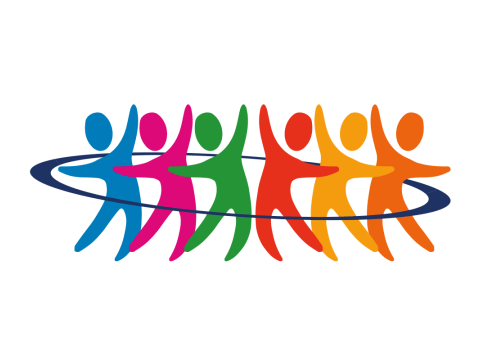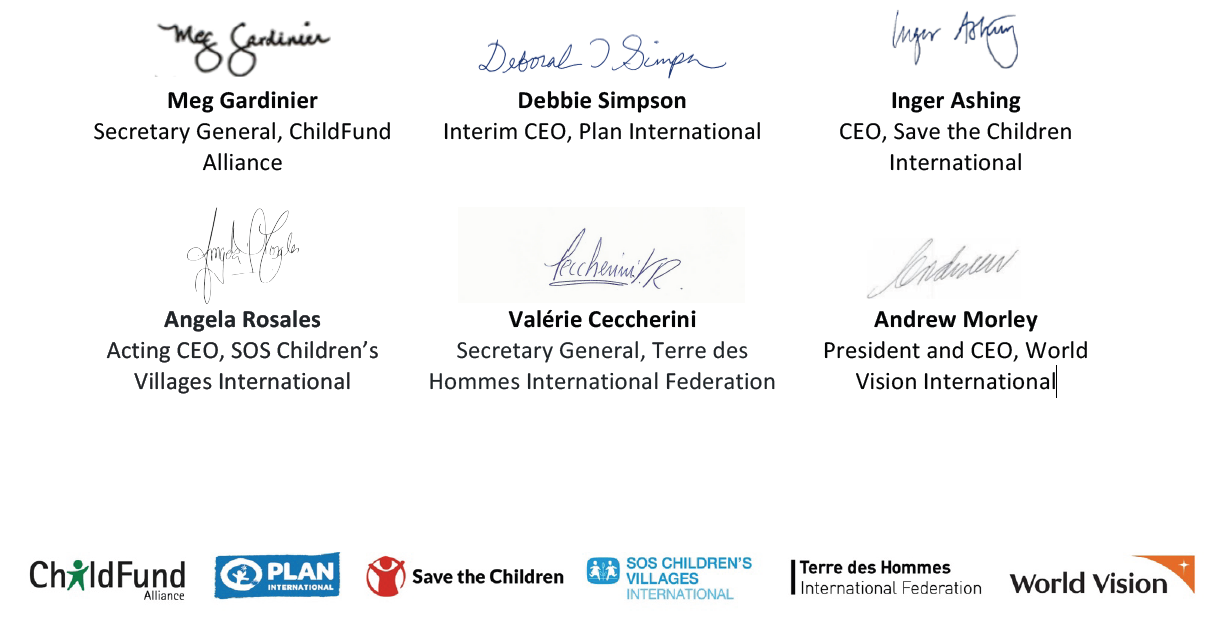Ignoring Children: A Potentially Grave Mistake for the Pact for the Future

IGNORING CHILDREN: A POTENTIALLY GRAVE MISTAKE FOR THE PACT FOR THE FUTURE
JOINT STATEMENT FROM THE CEOS OF JOINING FORCES
The United Nations Summit of the Future, scheduled for September 22-23, 2024, in New York, will see world leaders agreeing on the Pact for the Future. This Pact aims to re-energise international consensus and cooperation around existing agreements and commitments to deliver a better present and safeguard the future for our world. The Pact has the potential to significantly improve the tools and systems in place to fulfil child rights in addition to ensuring that all children can live and flourish in safety and peace. Children represent one-third of the world’s population, and an estimated 4.2 billion children are expected to be born over the next 30 years.
As leaders of child-focused international non-governmental organisations, we acknowledge and welcome the proposals put forward by a number of Member States on the zero draft of the Pact on children yet are alarmed that very few of these proposals were incorporated into Rev 1. Regrettably, the current draft of the Pact barely mentions children even though all the issues covered under the Pact directly impact children and their rights. There are significant intersections between the full spectrum of children’s rights, and particularly their rights to health, nutrition, social protection, education, participation, protection and non-discrimination; and the five chapters of the Pact: sustainable development; peace and security; science, technology and innovation and digital cooperation; youth and future generations; and transforming global governance. Failing to recognize these intersections will have negative consequences for children alive today and those who are yet to be born. Additionally, there is a concerning lack of emphasis on the specific needs and rights of girls, children with disabilities and other marginalized groups who face unique challenges and require tailored support to thrive. The future of the multilateral system rests on the shoulders of children. If they are not considered as stakeholders today, then how can world leaders expect them to carry forward the promises of multilateralism into tomorrow?
In recent years, children have spoken out and demanded change related to a range of critical issues such as the climate crisis, gender equality, racism, violence, police brutality, the fight against oppression, and the impacts of COVID-19. However, children are still not systematically and meaningfully included in decision-making processes at all levels, from the local to the global. This exclusion is even more pronounced for girls, whose voices and experiences are often overlooked, despite their critical insights and contributions.
Over the last year, we have talked to children around the world as part of our Call to Action for Child Participation. Their message was clear: children are the protagonists of the change that their countries
need; they have a right to be part of decisions that affect their future. Also, in the recently released report, “Girls’ Pact for the Future”1 girls and young women said that they are worried about the future of gender equality. Girls and adolescent girls emphasised the crucial need to be actively involved in decision-making spaces and to have their unique needs and rights recognised and addressed in these decisions.
If UN Member States make the mistake of leaving children out, countries will simply not be able to properly plan for the future, address new challenges, or achieve the 2030 Agenda. Children are not just younger versions of adults or part of the "youth" category, they are a distinct group with unique rights and perspectives. The UN Convention on the Rights of the Child clearly defines "children" as individuals under the age of 18. It recognises them as a separate and important demographic that requires special attention and protection, as well as rights holders with the capacity to inform decision-making that impacts them. They are the present and the future and will be the most affected by any agreements established in the Pact for the Future for years to come.
As leaders of organisations dedicated to the rights, well-being and future of children worldwide, we call on Member States to:
- Put child rights at the centre of the Pact, with a strong emphasis on gender equality and the empowerment of children in all their diversity
- Ensure that children, in all their diversity are able to meaningfully and safely participate in the shaping and implementation of the Pact of the Future, recognizing and addressing the specific barriers they face;
- Strengthen their commitment to and prioritise investment in child education, health, social protection, care and the protection of children from violence with targeted initiatives to close gender gaps and promote the rights of children in all their diversity;
- Prioritise the protection of children affected by armed conflict as a critical aspect of resolving conflict and sustaining peace and implement specific measures to protect girls from gender-based violence and exploitation in these contexts.
- Address barriers to children’s access to digital technologies and ensure their safety and protection from risks associated with it.
The future of our world depends on our ability to respect, protect and fulfill the rights of our children today and tomorrow. By acting on these proposals and involving children as equals, Member States can ensure that the Pact for the Future sets the stage for a more sustainable, safe, inclusive, and just global system.
We are ready to support and work with governments and international bodies to achieve these goals. Together with children, we can build a world where cooperation, peace and prosperity are ensured and pursued by and for all, including every child.
Signed,
